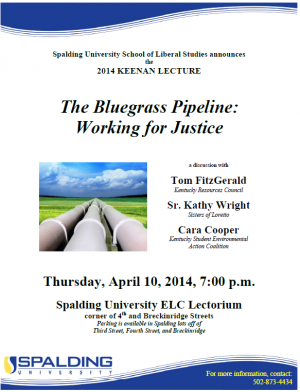|
By Nicholas Johnson, University of Louisville, University of Louisville  The School of Liberal Studies at Spalding University in Louisville hosted its annual Keenan Lecture on the topic of the Bluegrass Pipeline. In the interdisciplinary spirit of the School of Liberal Studies, this topic was chosen to explore the interconnections of religion with politics and environmental justice in the case of the pipeline project. The school’s chairwoman, Dr. Pattie Dillon, says that they “chose the Bluegrass Pipeline as the topic for this year’s lecture because it ties to the School of Liberal Studies’ theme this year—the natural environment—and because it links to the university’s mission of social justice and responding to the needs of the times in terms of the environment and the promotion of peace and justice.” The Bluegrass Pipeline project is a perfect example of conflict in the intersection of the natural environment and social justice. The proposed pipeline, a partnership of Williams Company and Boardwalk Pipeline Partners, is a buried 24” pipe that would transport hazardous natural gas liquids—a byproduct of hydraulic fracturing—from natural gas fields in the northeast, across more than a dozen Kentucky counties and several other states, and to the Gulf coast for refining and export. While it is clear that more fracking is not a good thing and that the environmental damages of the extraction and burning of fossil fuels are apparent, this particular case demonstrates several other ways in which Big Energy threatens social and environmental justice. The first panelist to speak was Sister Kathy Wright of the Sisters of Loretto. These nuns, who reside in the Kentucky’s ‘holy land,’ live by the motto “We work for justice and act for peace because the Gospel urges us.” The Sisters of Loretto have become strong opponents to the project for two significant reasons. First, the proposed path of the pipeline crosses lands owned by the group. In their pursuit of cleaner energy and environmental stewardship, the nuns had a pretty good reason to say “Not in our back yard!” But even once the surveyors were refused permission to route the pipeline through their property, the nuns did not give up the fight. As sister Wright said, the gospel gives them a sense of duty to protect the land and the people. As members of creation, they have a “big back yard.” The nuns recognize that projects such as the Bluegrass Pipeline won’t just affect them and their immediate neighbors, but represent a larger conflict that bring social and environmental injustice to their neighbors across the world. Following on the heels of the faith perspective was Cara Cooper, the statewide coordinator for the Kentucky Student Environmental Coalition(KSEC), representing students and young people who oppose and would be impacted by the pipeline. Ms. Cooper described some of the ways in which students had responded to the threat of the Bluegrass Pipeline by organizing, rallying, petitioning, and working hard to stop the pipeline. At Kentucky State University, pipeline employees surveyed school property without permission, showing no respect for proper protocol and procedure, and no concern for the sanctity of institutions of higher education. Such offenses caused a powerful group of student from across the state to devote their efforts to stopping the project, even if it did not immediately impact them or their campuses. Ms. Cooper, KSEC, and Kentucky students clearly share a concern for others and their planet as a whole as evidence by their efforts to stop the pipeline. The pipeline companies are coming to realize that they have made a mistake trying to bully their way across the state by buying off rural landowners and threatening to evict those who aren’t for sale by abusing the powers of eminent domain. After their claims that the project would be good for Kentucky were debunked, they have changed their tune to try to appeal to some misguided sense of patriotism and nationalism. The companies have essentially been called out on the benefits to the state, and now are saying “Yeah, sure, maybe it won’t help Kentucky directly, but think of all the American made energy this will produce, and how much of a step towards energy independence it represents!” (As if we don’t all know that these liquids are dirty fossil fuels intended for export to the rest of the world.) But, as Ms. Cooper pointedly concluded, “there is nothing energy independent or American about it!” Tom FitzGerald, the director of the Kentucky Resources Council, concluded the talk by offering a legal perspective of the project. For one, the threat of use of eminent domain for a project that does not benefit society as a whole (as a dam or road may) is an abuse that threatens fundamental private property rights. Additionally, since natural gas liquids are not regulated at a national level by the Federal Energy Regulatory Commission, they essentially occupy a regulatory free-zone due to the so-called ‘Halliburton loophole.’ Dr. Fitzgerald outlined several ways that citizens can take direct action to put pressure on lawmakers and regulators to close these loopholes and start properly regulating projects like the Bluegrass Pipeline. His four suggested ways to impact the project are:
0 Comments
Your comment will be posted after it is approved.
Leave a Reply. |
AboutThe Young Kentuckian is a blog of the Kentucky Student Environmental Coalition where youth share their work and ideas for Kentucky's bright future. Follow The Young Kentuckian on Facebook!
Categories
All
Archives
March 2023
|

